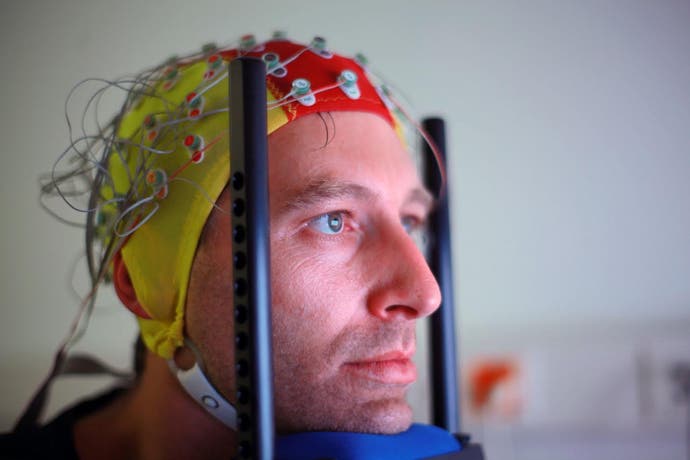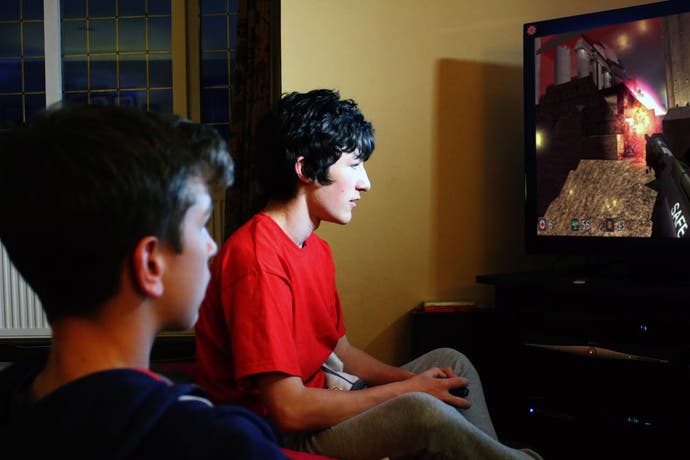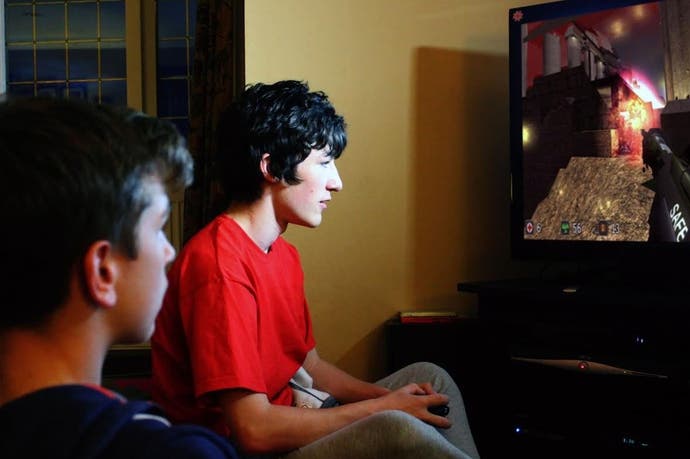Horizon's look at violence in gaming was a balanced take on a stale debate
After Tuesday's hollow GTA drama, the BBC's science show fares better.
The BBC's Make It Digital season stumbled out of the blocks with The Gamechangers, the muddled docudrama about Rockstar and Grand Theft Auto, and one of the most frustrating elements of the film was the way it fumbled the question of violence in games.
The Gamechangers framed much of its story as a clash between Rockstar's desire to create ambitious adult entertainment, and lawyer Jack Thompson's censorious crusade against violence in games, yet it never touched upon GTA's satirical nature or storylines.
On the few occasions where you did see someone actually playing the game, they were running around randomly shooting civilians - an activity that is certainly part of GTA, but not the aim of the game. The impression given was that Rockstar's high-faluting artistic integrity was ultimately the pursuit of nothing more noble than blood-soaked rampages and digital blowjobs.
There's something rather grim about all this - that even when supposedly lauding Britain's contribution to the digital future, the focus remains on the weary old canard of violence in games. Some four decades after video games first appeared, the mainstream conversation still hasn't moved beyond the rights and wrongs of shooting pixels shaped like people.
As another element of the Make It Digital season, you would hope that the BBC's flagship science show, Horizon, would offer something approaching the final word on the matter. Thankfully, last night's episode actually made a balanced case, despite its depressingly tabloid-esque title, Are Video Games Really That Bad?

The episode opens with the usual introductory stuff required to get non-gamers up to speed on what gaming in 2015 actually entails. Those taking part include Outside Xbox's Jane Douglas and journalists such as Leigh Alexander and Kurtis Simpson. Game development itself is represented by Tim Schafer, Ian Livingstone and Redshirt developer Mitu Khandaker-Kokoris.
We learn that lots of people play games these days, that games offer something for everyone, that most gamers are over 35 years old, and that more than half are now female. But there's a dark side, of course. Ominous tabloid front pages fill the screen as shadows close in. "What about the v-v-violence?" you ask, timidly.
First of all we hear about research that seems to suggest that virtual violence does indeed have an effect on the player. Scientists such as Professor Craig Anderson, a specialist in psychology at Iowa State University, detail experiments which seem to show that people who have just played a violent or aggressive game are more vindictive and less empathetic in the aftermath of their experience.
The limitations of such research are fairly clear, not least because there's been little study into the long-term impact - only temporary mood changes that immediately follow from a violent game. That action-based gaming leads to heightened competitiveness and raised levels of emotional excitement is hardly a smoking gun (no pun intended), and while this sort of research is interesting - and becoming more nuanced and sophisticated - it's still far from convincing.

More interesting are the experiments being conducted that go beyond the basic question of whether violent entertainment makes us violent in turn. Dr Andrew Przybylski of Oxford University studies the psychology of motivation, and his own study is a work of sadistic genius. He believes that focusing on the violence in games is a mistake, and instead looks past that to the core mechanisms underneath.
To do this, he uses a game called Bastet. It's basically Tetris, with a cruel twist. It uses the same seven core pieces as the iconic - and notably non-violent - Russian puzzler, but rather than providing the next piece at random, the game makes use of an algorithm that works out what the least useful piece will be, and gives you that instead. In other words, it is designed to frustrate, and Przybylski's results are broadly the same as those achieved by researchers like Anderson. In other words, it's not necessarily just violence that gets players pumped up.
Another fascinating experiment comes from Rene Weber of the University of California, who has been getting people to actually play first-person shooters inside an MRI scanner. The results seem to show that the amygdala, the part of the brain that processes emotional responses to external stimuli, is suppressed during play by the anterior cingulate cortex, which provides the link between reason and emotion. It seems there are several ways to read this info: it might suggest that violent games teach the brain to become desensitised, or it could be a sign that the brain is fully capable of recognising a fake scenario and thus turns down the emotions accordingly.
There's more - including experiments which show that Mario 64 permanently increases the brain's spatial navigation skills, and that Sonic All-Stars Racing can help the elderly maintain their mental edge - and the spread of ideas is both impressive and fascinating.

When it comes to the conclusion, Horizon hedges its bets in true scientific style. It doesn't discount the data which supports a link between in-game violence and real-world aggressive behaviour, but it does make a point of stating that despite a now sizeable body of research into the topic, there's still nothing suggesting a causal link.
What's really disappointing is that this episode needs to exist. While the current research is new and intriguing in its own right, it's still a shame that the same thematic ground has been trodden so many times. Certainly anyone who follows gaming will have heard the broad strokes of this debate over and over, and the arguments haven't really moved forwards since the 1990s, when Mortal Kombat and Carmageddon were predicted to usher in an age of blank-faced child monsters.
For all the statistics reeled out at the start of the programme detailing gaming's dominance of the entertainment landscape and its ubiquitous nature, it still gets treated as an oddity when it comes to TV coverage. The simple fact that "gamers" is still considered a distinct subset of the population deserving of study, as opposed to "readers" or "film watchers", is stranger than ever.
While it's a pity that this episode has to exist, Horizon has at least put together an even-handed overview of the current thinking on a tired topic. If you're at all interested in the psychology of gaming, it's definitely worth seeking out on iPlayer.









